| Srl | Item |
| 1 |
ID:
107025
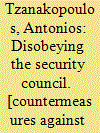

|
|
|
|
|
| Publication |
Oxford, Oxford University Press, 2011.
|
| Description |
xxxii, 243p.
|
| Series |
Oxford monographs in international law
|
| Standard Number |
9780199600762, hbk
|
|
|
|
|
|
|
|
|
|
|
|
Copies: C:1/I:0,R:0,Q:0
Circulation
| Accession# | Call# | Current Location | Status | Policy | Location |
| 056189 | 341.58/TZA 056189 | Main | On Shelf | General | |
|
|
|
|
| 2 |
ID:
164870
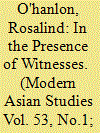

|
|
|
|
|
| Summary/Abstract |
British observers of the nineteenth-century panchayat were convinced that it represented a judicial forum of great antiquity, in which petitioners were able to gain local and direct access to justice. They contrasted the panchayat favourably with the delays and frustrations that beset the eighteenth-century East India Company's attempts to channel all petitions through its own courts. This article examines the history of the pre-colonial panchayat in western India and its early modern predecessors. During the early modern centuries, a diverse array of state-level and local corporate bodies made up the landscape for the submission of petitions and the hearing of suits. Although many suits were local in nature, the process of hearing and adjudication itself gave these judicial spaces a significant ‘public’ dimension, and their forms of argumentation frequently invoked general principles of justice and moral order. From the early eighteenth century, the new form of the panchayat came to supersede these older corporate bodies and to reshape the forms of public that gathered around them. The Maratha state, based in Pune, sought firmer control over revenue and justice. State officials promoted the panchayat as a new type of judicial arena, weakening the local corporate institutions and tying them more closely to the Pune court.
|
|
|
|
|
|
|
|
|
|
|
|
|
|
|
|
| 3 |
ID:
100200
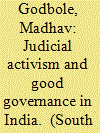

|
|
|
| 4 |
ID:
098307
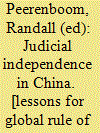

|
|
|
|
|
| Publication |
Cambridge, Cambridge University Press, 2010.
|
| Description |
x, 620p.
|
| Standard Number |
9780521137348
|
|
|
|
|
|
|
|
|
|
|
|
Copies: C:1/I:0,R:0,Q:0
Circulation
| Accession# | Call# | Current Location | Status | Policy | Location |
| 055186 | 347.51/PEE 055186 | Main | On Shelf | General | |
|
|
|
|
| 5 |
ID:
099144
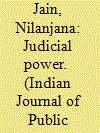

|
|
|
| 6 |
ID:
106029
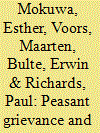

|
|
|
|
|
| Publication |
2011.
|
| Summary/Abstract |
Was the civil war in Sierra Leone (1991-2002) fought for diamonds, or was it a peasant insurgency motivated by agrarian grievances? The evidence on both sides is less than conclusive. This article scrutinizes the peasant insurgency argument via a more rigorous methodology. Hypotheses concerning intra-peasant tensions over marriage and farm labour are derived from an examination of the anthropological literature. These are tested using econometric tools, applied to data from a randomized survey of 2,239 households in 178 villages surrounding the Gola Forest in eastern and southern Sierra Leone, the cradle of the war. It is shown that a decade after the war ended peasant disputes over marriage continue to mark out an incipient class divide in isolated rural communities, as evidenced by cases presented in local courts and family moots. Disputes mainly involve a village elder suing a young man with weak social protection. Fines are exceptionally high, and mostly paid off in the form of coerced farm labour. It is argued that grievance over this long-standing form of labour exploitation fed insurgency, and contributed to the otherwise puzzlingly high levels of peasant-upon-peasant violence associated with the war in Sierra Leone.
|
|
|
|
|
|
|
|
|
|
|
|
|
|
|
|